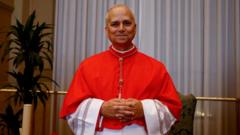Pope Robert Francis Prevost's election reflects a departure from tradition, potentially redefining the church's response to contemporary issues and political dynamics.
Pope Leo XIV: The First American Pontiff Reshapes Catholic Leadership

Pope Leo XIV: The First American Pontiff Reshapes Catholic Leadership
The elevation of Pope Leo XIV marks a significant shift in the Catholic Church's global influence.
Robert Francis Prevost, now known as Pope Leo XIV, has made history as the first American pontiff, elected on May 8, 2025, with voting cardinals signaling a shift in the Catholic Church's direction. This choice, resulting in white smoke from the Sistine Chapel after two days of secretive deliberation, counters the expectation that a papacy from a global superpower was improbable. As the 267th pope, Leo XIV’s background could instigate pivotal changes within Catholicism’s hierarchical framework.
Hailing from Chicago, the 69-year-old pontiff has spent significant time abroad, particularly in Peru, where he became a naturalized citizen and served for two decades. His tenure as a bishop and leader of an international religious order, combined with his pivotal role under Pope Francis overseeing the selection of bishops, positioned him as an attractive candidate for a church bureaucracy keen on stability amid recent challenges.
Pope Leo XIV's appointment appears poised to intervene in the polarized landscape of American Catholicism. Unlike the conservative currents reinforced during the Trump administration, the new pontiff’s diplomatic history suggests a commitment to reaching beyond national boundaries. This shift may alter the church's approach to global issues and promote a more inclusive dialogue among its diverse congregants worldwide.























